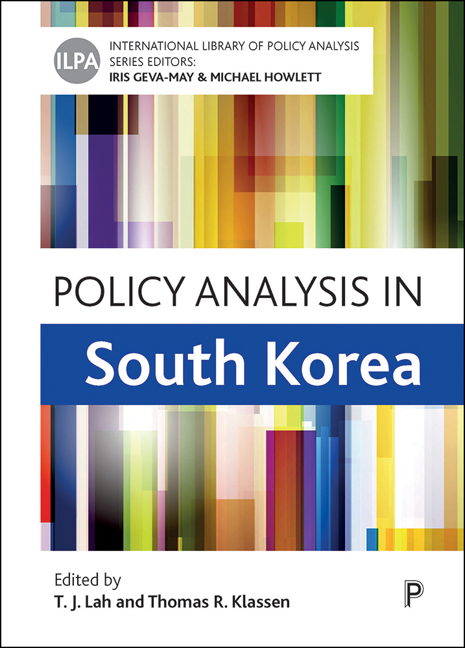Book contents
- Frontmatter
- Dedication
- Contents
- List of figures, tables and boxes
- List of abbreviations
- Notes on contributors
- Acknowledgements
- Editors’ introduction to the series
- Foreword
- Part One Overview of policy analysis in Korea
- Part Two Policy analysis by governments
- Part Three Committees, consultants, media, public inquiries and public opinion
- Part Four Parties, interest groups and advocacy-based policy analysis
- Part Five Academia, research institutes and policy analysis
- Index
sixteen - Think tanks and policy analysis in Korea
Published online by Cambridge University Press: 18 January 2024
- Frontmatter
- Dedication
- Contents
- List of figures, tables and boxes
- List of abbreviations
- Notes on contributors
- Acknowledgements
- Editors’ introduction to the series
- Foreword
- Part One Overview of policy analysis in Korea
- Part Two Policy analysis by governments
- Part Three Committees, consultants, media, public inquiries and public opinion
- Part Four Parties, interest groups and advocacy-based policy analysis
- Part Five Academia, research institutes and policy analysis
- Index
Summary
Introduction
A think tank consists of a group of educated people and a research environment. Think tanks conduct policy-oriented research analysis on a range of domestic and international issues and provide consultations based on this analysis that enables policy decision makers and the general public to make informed decisions (McGann, 2012). One of the most important functions of think tanks is to provide rational policy alternatives that are independent of the interests of specific groups and serve the public interest.
The roles of think tanks are manifold, and they are closely related to the general policy process. Overall, the policy process comprises policy agenda setting, policy analysis, policy decision making, policy implementation and policy evaluation. The major players in the policy process are public administrators, political parties and politicians, including the president and lawmakers. Other stakeholders include non-profit organisations, non-governmental organisations, civic groups, the media, policy community networking scholars, practitioners, experts, think tanks and professional associations.
From this perspective, think tanks are involved in the policy process, and they actively participate in setting policy agendas and the analysis, creation and evaluation of policies. Think tanks provide policy decision makers with ideas, information and data from their independent and professional research. It is also possible for researchers in think tanks to exert direct influence over the policy process by participating in decision making as appointed persons in charge of policymaking. Think tanks also advertise policies to those who are affected by them and educate others about such policies. Compared to individual experts and researchers who consult on public policies, think tanks have some comparative advantages because they can conduct systematic research on a policy issue, set up teams to provide solutions from multiple perspectives, if necessary, and guarantee funding that makes continued research possible. Given that policyrelated problems are becoming more complex and require more professional advice, the role of think tanks in the policy process is likely to become more significant as time passes (Smith, 1995).
One of the most important requirements for a think tank is professional expertise on a relevant policy topic, which enables professional research, consultations and development. Accordingly, it is crucial for a think tank to acquire competent professionals who have the capacity to solve policyrelated problems. The second requirement is independence.
- Type
- Chapter
- Information
- Policy Analysis in South Korea , pp. 243 - 261Publisher: Bristol University PressPrint publication year: 2023



